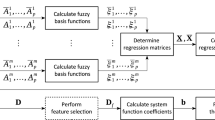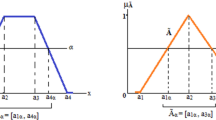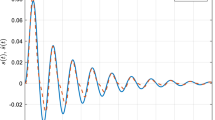Abstract
The main objective of this paper is to present a technique to permit the reliability analyst’s or system manager for increasing the performance of the system. As traditionally, it was assumed that probabilities in Markov chain models are deterministic in nature, but as the system are growing complex and more complex these days, so the reliability data are either insufficient or mixed with uncertainty. Thus to handle these kind of issues, the nth-order fuzzy Kolmogorov’s differential equations are developed by using a fuzzy Markov model of a repairable industrial system from its transition diagram and then evaluate the fuzzy reliability of the system both in transient as well as in steady state using Runge–Kutta method. Sensitivity analysis has been conducted for finding the most critical component of the system by varying the failure and repair rates of the system. Final results are compared with the existing results. To show the application of the proposed method, a case of the thermal power plant, a repairable industrial system, has been taken for evaluating the fuzzy reliability of the system.
Similar content being viewed by others
References
Adamyan A., David H.: System failure analysis through counters of Petri net models. Qual. Reliab. Eng. Int. 20(4), 317–335 (2004)
Kumar P., Aggarwal K.K.: Petri net modeling and reliability evaluation of distributed processing systems. Reliab. Eng. System Safety 41(2), 167–176 (1993)
Garg H., Sharma S.P.: Stochastic behavior analysis of industrial systems utilizing uncertain data. ISA Trans. 51(6), 752–762 (2012)
El-Damcese M.A.: Reliability of systems subject to common-cause hazards assumed to obey an exponential power model. Nucl. Eng. Design 167(1), 85–90 (1996)
German R.: Performance Analysis of Communication Systems Modeling with Non-Markovian Stochastic Petri nets. Wiley, New York (2000)
Aneziris O.N., Papazoglou I.A.: Fast Markovian method for dynamic safety analysis of process plants. J. Loss Prev. Process Ind. 17(1), 1–8 (2004)
Vinayak R., Dharmaraja S.: Semi-Markov modeling approach for deteriorating systems with preventive maintenance. Int. J. Perform. Eng. 8, 515–526 (2012)
Aven T., Kvalϕy J.T.: Implementing the Bayesian paradigm in risk analysis. Reliab. Eng. System Safety 78(2), 195–201 (2002)
Wu H.C.: Fuzzy reliability estimation using Bayesian approach. Comput. Ind. Eng. 46(3), 467–493 (2004)
Huang H.Z., Zuo M.J., Sun Z.Q.: Bayesian reliability analysis for fuzzy lifetime data. Fuzzy Sets Systems 157(12), 1674–1686 (2006)
El-Damcese M.A.: Reliability for consecutive-k-out-of-n:f systems subject to Markov-dependent components. Int. J. Appl. Math. 17(2), 137–142 (2005)
Misra N., Misra A.K., Dhariyal I.D.: Active redundancy allocations in series systems. Probab. Eng. Inf. Sci. 25, 219–235 (2011)
Garg H., Rani M., Sharma S.P.: An efficient two phase approach for solving reliability–redundancy allocation problem using artificial bee colony technique. Comput. Oper. Res. 40(12), 2961–2969 (2013)
Kaufmann A., Gupta M.M.: Introduction to Fuzzy Arithmatic: Theory and Applications. Van Nostrand, New York (1985)
Cai K.Y.: System failure engineering and fuzzy methodology: an introductory overview. Fuzzy Sets Systems 83, 113–133 (1996)
Donighi S.S., Khanmohammadi S.: A fuzzy reliability model for series–parallel systems. J. Ind. Eng. Int. 7(12), 10–18 (2011)
Zadeh L.A.: Fuzzy sets. Inf. Control 8, 338–353 (1965)
Kaleva O.: Fuzzy differential equations. Fuzzy Sets Systems 24(3), 301–317 (1987)
Seikala S.: On the fuzzy intial value problem. Fuzzy Sets Systems 24, 319–330 (1987)
Abbasbandy S., Allahviranloo T.: Numerical solutions of fuzzy differential equations by taylor method. J. Comput. Methods Appl. Math. 2, 113–124 (2002)
Buckley J.J., Feuring T.: Introduction to fuzzy partial differential equations. Fuzzy Sets Systems 105, 241–248 (1999)
Buckley J.J., Feuring T.: Fuzzy differential equations. Fuzzy Sets Systems 110, 43–54 (2000)
Ma M., Friedman M., Kandel A.: Numerical solutions of fuzzy differential equations. Fuzzy Sets Systems 105, 133–138 (1999)
Allahviranloo T., Kiani N.A., Motamedi N.: Solving fuzzy differential equatios by differential transformation method. Inform. Sci. 179(7), 956–966 (2009)
Allahviranloo T., Salahshour S.: A new approach for solving first order fuzzy differential equation. In: Hullermeier, E., Kruse, R., Hoffmann, F. (eds) Information Processing and Management of Uncertainty in Knowledge-Based Systems. Applications, Communications in Computer and Information Science vol. 81, pp. 522–531. Springer, Berlin (2010)
Kumar A., Lata S.: Reliability evaluation of condensate system using fuzzy Markov model. Annals Fuzzy Math. Inf. 4(2), 281–291 (2012)
Chen H., Xu W., Wu Q., Liu Z., Wang S.: Reliability analysis of arch dam subjected to seismic loads. Arab. J. Sci. Eng. 39(11), 7609–7619 (2014)
Abudhagir U.S., Shanmugavel S.: A novel dynamic reliability optimized resource scheduling algorithm for grid computing system. Arab. J. Sci. Eng. 39(10), 7087–7096 (2014)
Abdo M.A.B., Hori M.: Reliability of using 3-D woven polypropylene fiber in strengthening of a large-scale RC structure subjected to seismic loads. Arab. J. Sci. Eng. 37(3), 505–520 (2012)
Khelif R., Chateauneuf A.: Reliability-based replacement of polyethylene gas pipeline networks. Arab. J. Sci. Eng. 39(11), 8175–8185 (2014)
Yusuf I., Hussaini N.: A comparative analysis of three unit redundant systems with three types of failures. Arab. J. Sci. Eng. 39(4), 3337–3349 (2014)
Ram M., Kumar A.: Performance of a structure consisting a 2-out-of-3: F substructure under human failure. Arab. J. Sci. Eng. 39(11), 8383–8394 (2014)
Wu Z., Ming X.G., Song W., Zhu B., Xu Z.: Nuclear product design knowledge system based on FMEA method in new product development. Arab. J. Sci. Eng. 39(3), 2191–2203 (2014)
Vahidi H., Ghazban F., Abdoli M.A., Kazemi V.D., Banaei S.M.A.: Fuzzy analytical hierarchy process disposal method selection for an industrial state; case study charmshahr. Arab. J. Sci. Eng. 39(2), 725–735 (2014)
Su, X.; Ligang Wu, P.S.; Basin, M.V.: Reliable filtering with strict dissipativity for T-S fuzzy time-delay systems. IEEE Trans. Cybern. (2014). doi:10.1109/TCYB.2014.2308983
Lee H.M., Lin L., Su J.S.: A new fuzzy assessment based on interval value to evaluate the aggregative risk rate in software development. Int. J. Innov. Comput. Inform. Control 10(4), 1305–1312 (2014)
Su X., Wu L., Shi P.: Sensor random with random link failures; distributed filtering for T–S fuzzy systems. IEEE Trans. Ind. Inform. 9(3), 1739–1750 (2013)
Garg H., Rani M., Sharma S.P.: An approach for analyzing the reliability of industrial systems using soft computing based technique. Expert Systems Appl. 41(2), 489–501 (2014)
Author information
Authors and Affiliations
Corresponding author
Rights and permissions
About this article
Cite this article
Garg, H. An Approach for Analyzing the Reliability of Industrial System Using Fuzzy Kolmogorov’s Differential Equations. Arab J Sci Eng 40, 975–987 (2015). https://doi.org/10.1007/s13369-015-1584-2
Received:
Accepted:
Published:
Issue Date:
DOI: https://doi.org/10.1007/s13369-015-1584-2




